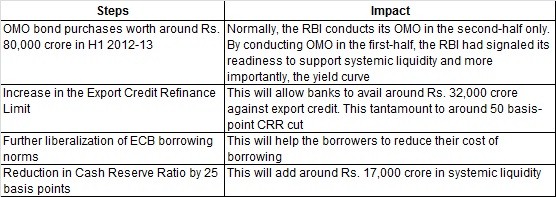Dhawal Dalal EVP, Head - Fixed Income, DSP BlackRock makes a strong case for investing in government bonds for a time horizon of three to six months.
 Recent reduction in cash reserve ratio (CRR)
by the Reserve Bank of India (RBI) has been viewed positively by the market
participants.
Recent reduction in cash reserve ratio (CRR)
by the Reserve Bank of India (RBI) has been viewed positively by the market
participants.
Although the government bond price action after the CRR cut suggested that some market participants were disappointed as they had been expecting more from the RBI, we sense a shift in the RBI’s monetary policy approach going forward.
We believe that it is important to recognize the subtle change in the RBI’s approach and its likely impact on the government bond prices in the midterm.
Although the RBI is unlikely to reduce the repo rate due to increasing inflationary pressures, we believe that the RBI is gradually loosening its hawkish stance on monetary policy by stealth. We think it will continue to do more of that in the next three months as well.
Some recent steps taken by the RBI in this financial year and their impact on the bond market are as follows:

The RBI is also likely to conduct more OMO (open market operations) bond purchases
worth Rs. 1 lakh crore in the second-half of the year to support systemic
liquidity and M3 (liquid liabilities as a % of GDP) growth.
At the same time, the government appears to
be sincere in its efforts to address fiscal deficit and its approach for fiscal
consolidation, by pushing for the crucial diesel price hike last week.
All these developments bode well for
government bonds over the medium term.
With the benchmark 10Y yield @ 8.16% pa,
government bonds seem to offer excellent value. At these levels, government
bonds are not pricing in any rate cut expectations. Therefore, we believe that
this represents a great entry point to invest in liquid government bonds with
an investment horizon of 3 to 6M.
To be fair, there are two near-term risks in
the market. One, prospective increase in the government borrowing program by
around Rs. 75,000 crore due to likely upward revision in the fiscal deficit for
FY2012-13. Second, a possible sovereign credit rating downgrade by rating
agencies.
These risks, as and when they
materialize, are likely to push yields up by around 15-25 basis points.
However, we believe that investors should take advantage of the development and
further increase their exposure to liquid government bonds.
The benchmark 10Y government bond
yield will trend lower over the medium-term. The question in everyone’s mind is
- can it go below 8% level?
We believe that the benchmark 10Y
government bond yield will trade below 8% level only when the RBI cuts the
benchmark repo rate, or if there is a substantial improvement in the systematic
liquidity.
Going by the current developments,
if the government is able to maintain the momentum and push for more reforms
which help the economy gain traction and contain fiscal deficit through various
means, then there is a greater chance that the RBI will consider reducing the
Repo Rate, notwithstanding the inflationary pressures. We think that RBI may
reduce the repo rate by 25 bps in 1Q2013.
As and when that happens, we
believe that the benchmark 10Y yield may dip below 8% and may trade between
7.75% -8% pa range.
With deteriorating credit environment and prospects of widening in credit spreads, we believe that the government bonds offer attractive medium-term investment opportunity with comparatively lower credit risk and better liquidity.



